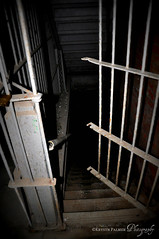 Amy Fettig of the National Prison Project and Matt Simpson, of the Texas ACLU have tackled a rough topic- one to which advocates for juvenile justice should pay heed — the plight of juveniles in solitary confinement.
Amy Fettig of the National Prison Project and Matt Simpson, of the Texas ACLU have tackled a rough topic- one to which advocates for juvenile justice should pay heed — the plight of juveniles in solitary confinement.
16 and Solitary: Texas Jails Isolate Children is their examination of this problem, and I would venture to call it required reading. Using data from a recent report, Conditions for Certified Juveniles in Texas County Jails, by researchers at the Lyndon B. Johnson School of Public Affairs at the University of Texas, they provide even more ammunition in the battle to get our juveniles out of adult prisons.
Here is one key passage that I believe provides a good summation:
While in solitary confinement, children’s mental and physical health is severely compromised. The LBJ report notes the broad consensus among mental health experts that such long-term solitary confinement is psychologically harmful for adults. For children in solitary confinement, the impact is even more traumatic. Children experience time differently than adults, have a special need for social stimulation, and are damaged by forced isolation more quickly and severely than adults. It is also true that young people’s brains are still developing, which places youth at a higher risk of psychological harm when healthy development is impeded. But the psychological harm is not limited to developmental issues — it often means life or death. As the report notes, the risk of suicide and self-harm, including cutting and other acts of self-mutilation, increases exponentially for children in adult jails who are 36 times more likely to commit suicide than their counterparts in juvenile facilities.
Lives are quite literally on the line here. The difference between juvenile and adult psychology is thrown into stark relief when you look at the impact solitary confinement has on each. But that’s not all. In addition to the hazards these practices pose to the incarcerated, they also hold a dim outlook for those outside the prison bars.
Reviewing the data, the LBJ report notes ‘the impact of prolonged isolation may have mental health consequences that will make it difficult for these youth to reintegrate, and may increase the likelihood that they will recidivate.’ Solitary confinement hurts children and ultimately undermines public safety.
Once more it all comes down to foundations laid in childhood. Even though the rationale often presented is that the kids are put in solitary to protect them from the adult prison population (something that does need to occur), doing so simply damages them in other ways.
Children do not belong in adult facilities. As a matter of fact the vast majority would be better served by community programs, substance abuse / mental health aid, and other rehabilitation-oriented approaches. This is a fact proved over and over again by studies from both sides of the political aisle.
As publishers we have tried to address these issues both through our most recent book, Born, Not Raised, and through the news round-ups we present on this blog. We can only hope that by helping to put a human face on the kids behind bars we can mobilize people to make effective, and fiscally sensible, change.









